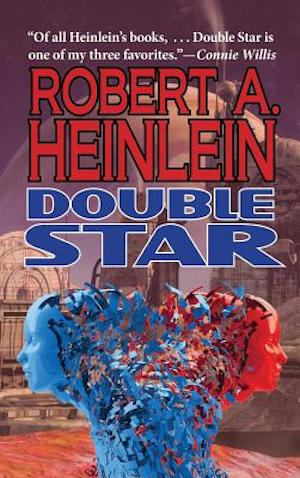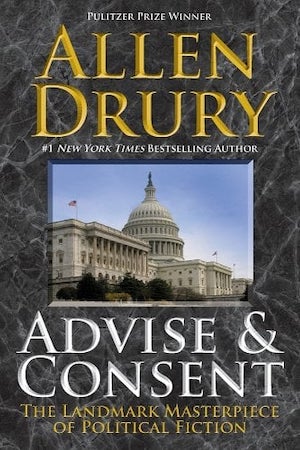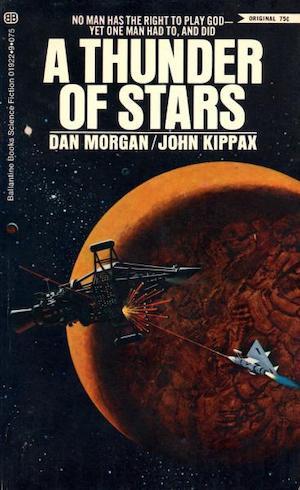Embarrassing secrets and the lengths to which people in power will go to conceal them is a plot seed to which many authors (of speculative and mundane political thrillers alike) have turned, even before Watergate, and no doubt before the Teapot Dome scandal. The following authors certainly did.
Double Star by Robert Heinlein (1956)

Lawrence Smith, AKA Lorenzo Smythe, AKA “The Great Lorenzo” is an actor as talented as he is unappreciated by the public. Talent, obscurity, and physical appearance make him ideal for a role that will be as unheralded as it is history-shaping: playing the part of visionary politician John Joseph Bonforte.
John Joseph Bonforte has been kidnapped. To reveal this would be (for certain contrived reasons) politically disastrous. Bonforte’s supporters resort to hiring Smith until Bonforte can be located and rescued. Smith isn’t a fan of the Expansionist politician but the job is the role of a lifetime. Literally, as it turns out.
One could make a case that this is Heinlein’s best novel, so it’s a bit of a pity the whole plot is designed to justify a monumental bit of electoral fraud (which is claimed to for the greater good).
Advise and Consent by Allen Drury (1959)

In a period of rapprochement between Americans and Soviets, Robert Leffingwell seems a prudent nominee for Secretary of State. The respected liberal may be seen as an appeaser by the no doubt paranoid right, but Leffingwell is clearly the correct man at the correct time to help guide the American ship of state towards continued peace. Approval is practically ensured.
Senator Cooley, determined to block Leffingwell’s appointment, takes a far more detailed look at Leffingwell’s past than is good for Leffingwell’s future. In his youth, Leffingwell was a member of a Communist cell. Can such a man be trusted in high office? And to what lengths will his supporters go to ensure Leffingwell’s appointment?
The idea that Russians might suborn a high-ranking member of the American government is a bit silly, but the dramatic potential trumps plausibility… One thing that becomes fatally clear is that politicians may hesitate to reveal opposition secrets because everyone has secrets; once cycles of retaliatory revelation begin, it’s impossible to predict how it will all play out. Tragically, in this case.
House of Cards by Michael Dobbs (1995)

Henry Collingridge triumphs in the power struggle following Margaret Thatcher’s exit. The new Prime Minister owes success to the support of Chief Whip Francis “FU” Urquhart. FU expects to be repaid with a prestigious ministerial position. Collingridge makes the fatal error of disappointing FU. If the current PM choses to betray FU, then FU will more than return the favor.
Any Chief Whip is, by the nature of the position, well-informed about secrets potentially embarrassing to the Prime Minister’s office. FU is exceptionally well-informed and quite unburdened by petty concerns like ethics. He wields his knowledge with brutal efficiency. Should this prove insufficient…? Well, FU isn’t above well-timed murder.
Dobbs’ political thriller draws on Dobbs’ experiences as part of the Thatcher regime for its verisimilitude. FU’s cold fury at his treatment might have been inspired by Chief of Staff Dobbs’ own falling out with Thatcher. Given how relentlessly methodical FU’s scheme is, Thatcher might have been lucky that Dobbs decided to deal with his ouster by means of novel-writing and not a palace coup.
A Thunder of Stars by Dan Morgan and John Kippax (1970)

The first volume in the Venturer 12 series begins as all interstellar patrol series should, with extensive Commissioning Board hearings to determine the best candidate for the position of captain of the Venturer. Commander Tom Bruce is clearly that man. However, certain elements want someone else and will cheerfully accept any pretext for rejecting Bruce.
When Bruce orders the destruction of an out-of-control spacecraft, Bruce’s opponents seem to have the ammunition they need. True, the ship was headed for Earth and Bruce saved millions by having it destroyed. However, this is not the first time Bruce has ordered the deaths of innocents. Now his enemies have pretext for getting the Minos IV incident on record.
This is the sort of narrative universe in which tough men are often forced to make hard decisions, so it should be no surprise Bruce had a good reason to kill the Minos IV colonists. What should raise eyebrows but doesn’t is that Bruce’s executive officer is an ex-lover who plans to use her position to police which crewmembers sleep with Bruce. I can see no way in which that could go horribly wrong.
The Guardian of Isis by Monica Hughes (1981)

David London has for decades ruled the Isis colony unchallenged and unchecked. His whims become regulations. His irrational dislikes—for example, loathing Jody n’Komo because Jody resembles Jody’s grandfather, once one of London’s rivals—shape public policy. When crisis looms, London orders Jody on a quest outside the single known habitable valley. This is intended as a death sentence.
Jody survives his exile. He discovers that history is not quite as London has depicted it. Jody learns that London has lied quite outrageously about both the colony’s and London’s own past. Jody must now decide how to best serve the public interest with what he now knows.
London is a terrible and fully entrenched administrator. This book suggests a grim future for the colony (although the fact that there is a third book in the trilogy of which The Guardian of Isis is the second volume should give readers some hope). It’s just as well that it’s a plot point that isolated Isis isn’t the only human occupied world.
***
There are many books I could have mentioned, either because I’ve mentioned them before (The Multiple Man, Seven Days in May, and The Texas-Israeli War: 1999) or because I forgot them. Feel free to mention your favorites in comments, which are as ever below.
In the words of fanfiction author Musty181, four-time Hugo finalist, prolific book reviewer, and perennial Darwin Award nominee James Davis Nicoll “looks like a default mii with glasses.” His work has appeared in Interzone, Publishers Weekly and Romantic Times as well as on his own websites, James Nicoll Reviews (where he is assisted by editor Karen Lofstrom and web person Adrienne L. Travis) and the 2021, 2022, and 2023 Aurora Award finalist Young People Read Old SFF (where he is assisted by web person Adrienne L. Travis). His Patreon can be found here.










